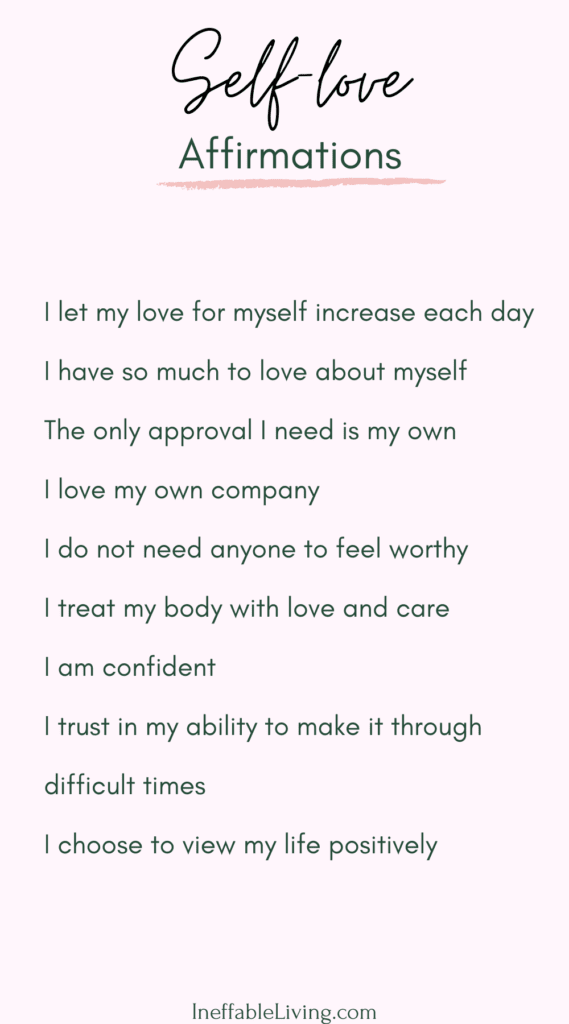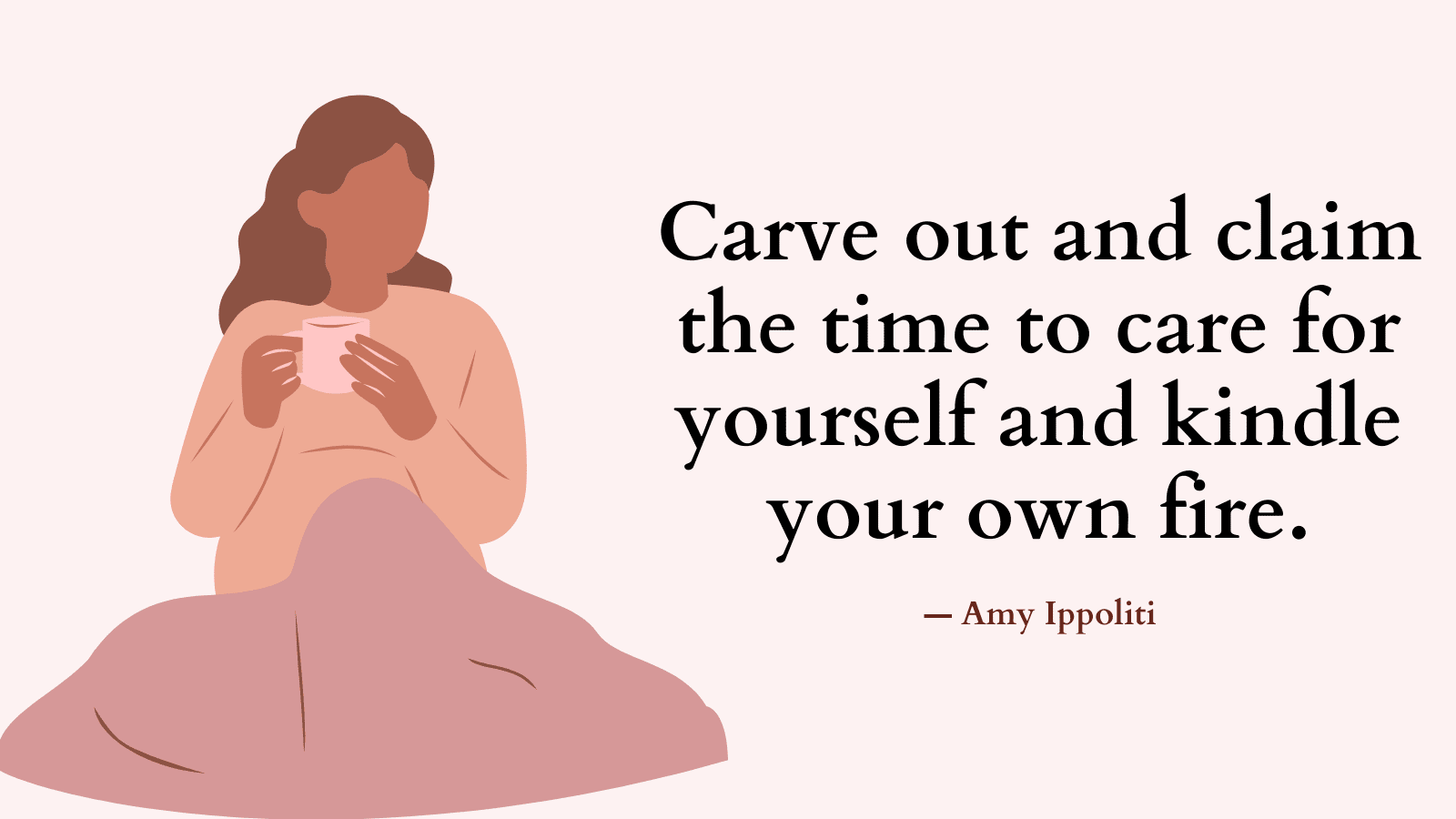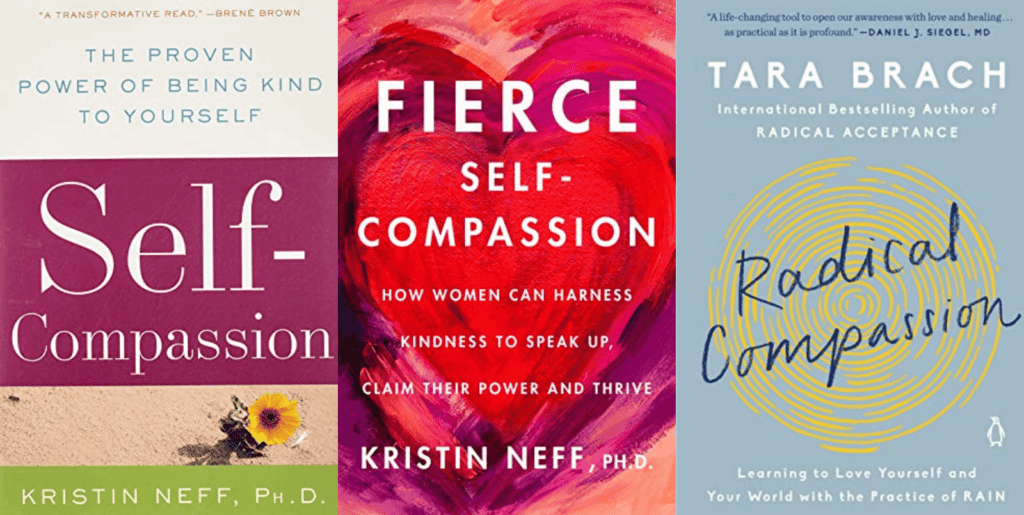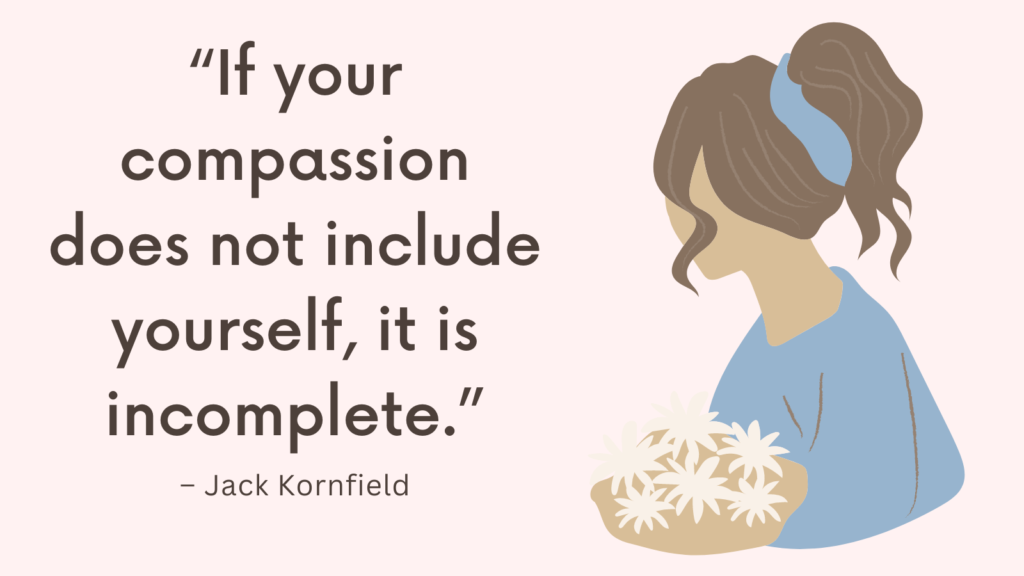Today, you’re going to learn how to be gentle with yourself using self-compassion practices.
What Is Self-Compassion?
Self-compassion is the ability to give ourselves the same kindness we would give others.
When a loved one is feeling inadequate or is in pain, we instinctively offer support. In a soft voice, we may say something like, “I’m so sorry. I’m here for you. Is there anything I can do to help?”
In the same way, we can be gentle with ourselves. We can pause to ask what we need and comfort and support ourselves.
Self-compassion is a practice. We can train our brains to respond to our pain with compassion.
A wealth of research shows that self-compassion increases emotional resilience – the ability to adapt to and “roll” with stressful situations. (*) (*)
Related: Best 18 Self Compassion Journal Prompts (+FREE Worksheets)
How Self-Compassionate Are You?
The following are signs you need some self-compassion. Do you relate with any of the following:
- You tend to feel alone and like everyone else is much happier when you’re feeling down.
- You tend to fixate on everything that’s wrong when you’re feeling down.
- You become consumed by feelings of inadequacy when you fail or make a mistake.
- You tend to be judgmental about your own inadequacies.
- You tend to be impatient and unaccepting toward aspects of your personality that you don’t like.
If so, keep reading to learn how to be gentle with yourself.
Related: Top 39 Self Love Mantras To Practice Daily (+9 Ways To Grow In Self-Love)
The Three Elements Of Self-Compassion
Although self-compassion is about being kind with ourselves, kindness alone is not enough.
We also need to see and admit our failure, put our own experiences into perspective, and connect our struggles to those of others.
According to Kristin Neff, Ph.D. is a pioneer in the study of self-compassion, there are three components of self-compassion: Self-kindness, common humanity, and mindfulness.
1. Self-kindness – This is the desire to alleviate suffering and the motivational core of self-compassion.
Self-kindness is a warm, supportive attitude toward ourselves.
2. Common humanity – This is when we recognize our own humanity. That is we acknowledge that all humans are imperfect.
While this may sound obvious, most of us fall intot he trap of irrationally feeling like everyone else is doing just fine and it’s only us who are in pain.
This sense of disconnection only adds insult to injury and further intensifies our suffering.
When we remember that we’re not alone in our pain, we feel alone.
3. Mindfulness – This is the ability to acknowledge our discomfort. This means we don’t run away from our pain or pretend that it’s not there.
This can be challenging because mindfulness goes against our natural tendencies. Rather than being present with our pain, we tend to get lost in the future (worry) or the past (regret).
When we practice being mindful with our pain, we gain perspective on ourselves and our lives in a way that help us determine the best course of action to help ourselves.
Related: How To Start A Self Love Journey? Top 10 Powerful Ways to Love Yourself More
Self-Compassionate Statements
How To Be Gentle With Yourself?
#1. Think About How You Would Treat A Dear Friend
The best way to learn how to practice self-compassion is to observe how you treat your loved ones when they’re in pain and do the same for yourself.
Think about a recent time when a dear friend was suffering. They may be grieving the loss of a pet, feeling overwhelmed by caring for the kids, feeling inadequate because of a mistake.
How did you respond to them? What words of comfort did you offer? How was your body language (i.e. tone of voice, posture, eye gaze, etc.)?
Can you do the same for yourself when you’re suffering?
Related: Top 45 Self Care Day Ideas at Home To Kickstart Your Self Care Ritual

#2. Challenge Negative Beliefs Around Being Gentle With Yourself
Negative beliefs, such as self-compassion and being gentle with ourselves will turn us into lazy, selfish, self-indulgent losers can prevent us from treating ourselves with compassion.
Start by identifying negative beliefs around self-compassion.
Once you have a list of those beliefs, challenge them by answering the following question for each belief:
- What evidence supports this thought? What evidence does not support this thought?
- What’s the worst that can happen? But what’s the best that can happen?
- What’s the effect of believing these interpretations and viewpoints? What might be the effect of changing my thinking?
- What would I tell a friend who has similar beliefs?
Related: Negative Core Beliefs List (& 8 Tips On How To Challenge Them)
#3. Allow Yourself To Sit With Your Feelings
As human beings, we’re all born equipped to feel a range of emotional experiences from joy to despair.
Emotions bring color and intensity to our lives and they provide us with important information on what we need.
Even difficult emotions like anger and sadness provide useful feedback. For instance, anger may tell us that we’ve experienced a form of injustice and give up enough energy to stand up for ourselves.
One way to practice self-compassion is allow yourself to sit with your feelings and process them.
Ask yourself the following questions:
- What am I feeling right now?
- Why am I feeling this way?
- What do I need right now?
Related: How To Feel Your Feelings & Sit With Painful Emotions? (Top 9 Difficult Emotions)
#4. Soothe Yourself Through Touch
Gentle physical touch can calm us and make us feel loved, even if we’re the ones touching ourselves.
The following is a list of compassionate touch you can experiment with:
- Cradling your face in your hands
- Crossing your arms and resting them on your shoulders
- Hugging yourself and rocking back and forth
- Putting one or two hands over your heart
- Gently squeezing your hand
- Gently stroking your forearms or upper shoulders
Related: Best 100 Self Care Affirmations To Honor Yourself
#5. Practice Self-Care
Although self-compassion is what motivates to take care of ourselves, the opposite is also true.
Taking care of ourselves can foster feelings of self-compassion.
The following is a list of compassionate gestures to choose from:
- Write yourself an encourage letter
- Go for a walk
- Listen to soothing music
- Take a bath
- Watch something funny
- Write in a journal
- Dance
- Play a musical instrument
- Cook something you love
- Read a book
- Meditate
- Enjoy a cup of tea
- Light a scented candle
- Call a friend or family member

FAQ
Why is self-compassion important?
Self-compassion is important because it helps us cultivate a positive, supportive relationship with ourselves.
It promotes emotional well-being, resilience, and self-acceptance.
It also allows us to respond to our own mistakes or failures with kindness rather than harsh self-judgment.
Can self-compassion make me lose motivation or become complacent?
No, self-compassion does not lead to complacency.
In fact, research suggests that self-compassion is associated with increased motivation and resilience.
When we treat ourselves kindly and supportively, we’re more likely to bounce back from setbacks and continue pursuing our goals.
Is self-compassion the same as self-esteem?
Self-compassion and self-esteem are related but distinct concepts.
Self-esteem typically relies on external validation and fluctuates based on achievements or comparisons.
On the other hand, self-compassion focuses on embracing our inherent worth and offering compassion to ourselves regardless of external factors.
Can self-compassion help with managing stress and anxiety?
Yes, practicing self-compassion can be beneficial for managing stress and anxiety.
It provides a supportive and soothing internal dialogue that helps us navigate difficult emotions and situations with greater resilience and calmness.
References
- Portions of this article were adapted from the book Fierce Self‑Compassion, © 2021 by Kristin Neff. All rights reserved.
- The Transformative Effects of Mindful Self-Compassion – Mindful
- The Role of Self-Compassion in Development: A Healthier Way to Relate to Oneself – PMC (nih.gov)
- The Scientific Benefits of Self-Compassion – The Center for Compassion and Altruism Research and Education (stanford.edu)
- The Relationship Among the Components of Self-compassion: A Pilot Study Using a Compassionate Writing Intervention to Enhance Self-kindness, Common Humanity, and Mindfulness | SpringerLink
- Why self-compassion – not self-esteem – leads to success – BBC Worklife
- Frontiers | Mindful Self-Compassion Training Reduces Stress and Burnout Symptoms Among Practicing Psychologists: A Randomized Controlled Trial of a Brief Web-Based Intervention (frontiersin.org)



